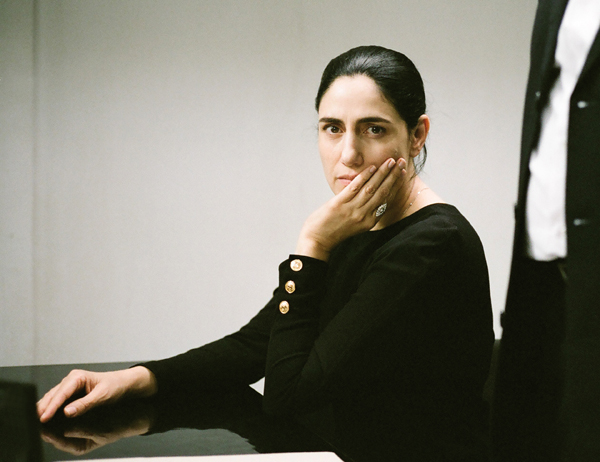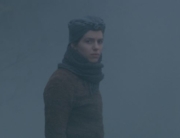The struggle of modern women against conservative religious restrictions has heightened significance around the world today. Gett: The Trial of Viviane Amsalem forcefully crystallizes the juxtaposition of hypocrisy, cynicism, frustration, and absurdity when a woman today is forced to abide with ancient rules. This realistic film intimately focuses on how this plays out in Israel, a democracy with no civil marriage for anyone.
Since its founding, the ultra-Orthodox rabbinical courts have jurisdiction over Jewish marriages, and they operate within the secular government’s Ministry of Justice. When divorce is sought, contradictions abound: though only rabbis can preside over the dissolution of a marriage, their mandate is to keep couples together, under the Talmudic principle of peace in the family. Additionally, only the husband can actually grant the divorce decree, the gett. Without his consent, the woman faces social opprobrium for separating from her husband; she is agunah, chained to a dead marriage and her children considered illegitimate.
The bothersome facts of the case before the three-judge rabbinical court panel in the claustrophobic courtroom are: Viviane Amsalem, mother of four children, has been separated for three years from her observant Moroccan immigrant husband, and she wants to end their 20-year marriage, even though he has not obviously violated Jewish law against her—no beatings, no desertion, no destitution.
Viviane is vividly portrayed by the sensuous and mesmerizing Ronit Elkabetz, one of world cinema’s great actresses, the Anna Magnani of today, intense (particularly in her frequent camera-facing close-ups) and volcanic. She uses every inch of her body for voluble expression.
This film is the capstone of the trilogy she and her brother Shlomi Elkabetz have written and codirected over a decade, exploring the deterioration of the Amsalem marriage, and inspired by their mother’s struggles. It’s the opposite of Richard Linklater’s tracking of a couple’s romantic trajectory in Before Sunrise, , and Before Midnight, which centers on falling in love and maintaining a relationship over time. Vivane and Elisha (Simon Abkarian) have been falling out of love in To Take a Wife (2004), set in Haifa in 1979, and Shiva (2008), set during the 1991 Gulf War. (Both had limited festival screenings in the U.S.; the latter is not available on Region 1 DVD).
While seeing the prequels adds to the audience’s knowledge of who is lying more through this frequently comic procedure (comparable to how Americans used to fake following archaic state requirements until Puritanical divorce laws were liberalized relatively recently), Gett puts viewers in the same observational position as the perplexed judges.
But the process can’t begin until the husband shows up in court. A demurely dressed and postured Viviane barely contains her anger when Elisha has failed to appear. (The time between each session is noted on the screen—six months later, three months later, two months later.) The chief judge (Eli Gorstein) does try to be helpful; he offers retaliation against the husband for his absence, including confiscating his driver’s license—if he had one. Elisha’s refusal to get one, and let his family leave their house, is one of the wife’s charges against him.
The judges order him jailed, yet month after month he defies agreements he makes while incarcerated, including to answer Viviane’s narrowly legitimate charges in court that “he has become insufferable for me.” Still, the court forces her to return to him, to no avail. A year and a half after the trial first began, his brother shuffles in to make Elisha’s case.
The two opposing advocates symbolize different world views, and how each shrewdly tries to manipulate the tribunal is very entertaining. Viviane’s lawyer, Carmel Ben-Tovim (Menashe Noy), is a shaggy-haired secular counsel with a nice suit and attaché case who can barely contain his contempt for this antiquated system. The husband’s brother, Shimon, is sagaciously played by Sasson Gabbai (Ronit Elkabetz’s co-star in The Band’s Visit), who puts on the Israeli equivalent of Sam Ervin’s “aw shucks, I’m just a country lawyer” routine from the Watergate hearings. Wearing a yarmulke and carrying a shopping bag into court, Shimon insists on being addressed as “Rabbi,” constantly quotes the Talmud to the impressed judges, and chides his counterpart for not living up to Carmel’s eminent father’s observance.
Meanwhile, the rigidly obstinate husband delivers zinging criticisms of his wife in French to rile her up. When he realizes one of the judges is translating his off-the-record comments to the others, he switches to Arabic. (Reflecting the complex issues of Israel’s ethnic diversity, undercurrents of the Ashkenazi majority judges not understanding the culture of the Mizrahi family resonates throughout.)
Her lawyer seizes on the brother’s overconfidence to insist on witnesses to explore just how contentious the marriage has been. A series of delays leads to a Rashomon-like parade of relatives, neighbors, storekeepers, and synagogue congregants, each with a grudge or distinct bias. Many of whom were seen in the earlier films. Even as Elisha’s brother keeps insisting on the prohibition against listening to gossip, the rabbis can’t help getting caught up in the colorful (and sometimes very funny) tales.
Three years on, the accusations become ever more personal, and between the advocates, too, in the tradition of classic courtroom dramas, such as Edward Dmytryk’s The Caine Mutiny (1954) and Stanley Kramer’s Inherit the Wind (1960). Even the chief judge gets fed up. Occasionally the scene shifts to the adjacent corridor full of those who fruitlessly wait and wait, where the filmmakers listened for their research because they weren’t allowed inside any proceedings. The threats increase, and negotiated deals come and go, through five more years. If you find the final decisions inconclusive, the Elkabetzs are toying with revisiting the couple in the future.
One of the many ironies of this religious system is that there are ultra-Orthodox charities to help women waiting in vain for a divorce decree. The film has generated so much debate in Israel that it may be the first feature film screened at the judges’ annual conference this month—if the administrative judge deems it modest enough, because the rabbis, like the husband here, stay away from the cinema just in case something inappropriate might be seen. It will be unfortunate if Ronit Elkabetz’s (briefly seen) sandaled foot is considered too alluring, because the film is a thought-provoking indictment of government interference into women’s bodies and lives.







Leave A Comment